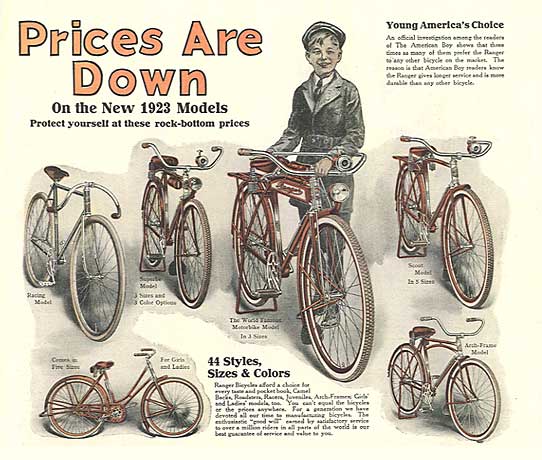
 In 1923 you could choose
from 44 styles!
In 1923 you could choose
from 44 styles!Click on picture to enlarge
| In my seventeen years working in retail bicycle shops, I saw it many
times: that glassy-eyed, dumbstruck look that crept into customers’
faces when they gazed upon row after row of bicycles. Sometimes, no matter
how carefully we approached, no matter how softly we spoke, no matter
how patiently we answered questions, they’d leave, never to be seen
again. I’m sympathetic. I know bicycles so they don’t scare me. But other things do. For instance, heading to the lumber store to purchase the right piece of wood for a project: Forget it. The minute I’m next to those towering stacks of lumber, rubbing shoulders with all those contractor types who know wood only the way termites can, I become nervous, jittery. When the salesperson finally spots me and approaches, I can barely communicate and promptly buy the first stick he offers. Better that than admit ignorance and ask a lot of stupid questions. I mean, we don’t even speak the same language. Plus, there are people in line who actually know something. I sure don’t want to hold them up. So please, don’t think of me as a bicycle expert here to intimidate. Think of me as a lot like you; just someone who knows a bit more about bikes. I’ll try to guide you and take some of the confusion and mystery out of the bicycle shopping process. Before we go any further, I recommend reading How to Buy a Bike, which is the first part of this story. It answers other useful questions about selecting the right ride. Hit the Shops It’s daunting to be presented with a huge selection, especially when the choices are as varied as they are in bicycle stores today. But don’t let the large selection scare you. Instead look at it as the opportunity to get the right bike at the right price. If the store had only a few bikes to select from, it’s possible they might not have one type or another that would be perfect for you. When you’re shopping, having more bikes to look at and test-ride is a good thing. Brace yourself, though. The salesperson wants to help but he has to get to know you first. Give him a chance even if it’s uncomfortable. It may take a few tries before he figures how to help you out. Try to be open-minded and answer the questions he asks as best you can. With any luck at all, you’ll find common ground and start communicating. If you can’t bear the thought of dealing one-on-one with a salesperson, bring a friend along who’s more comfortable and let them help translate. Beware the know-it-all though. You don’t want someone who’s going to argue with the salesperson every time he tries to explain something. That just leads to confusion and hostility and turns what should be a fun process into a disaster. It’s better to bring someone who’s enthusiastic about bikes and has an idea what you’re like and how you’ll like to ride. Buy the Right Bike One of the confusing parts of picking a bike is that manufacturers make a variety of models designed for specific purposes. Generally, what you want to do with the bike will match one of the available models. Sometimes, however, you may have to look outside or beyond the category of bike you think might work at first. For example, many cyclists want to tour on the road. The most efficient way to do this is to ride a traditional touring bike with dropped handlebars and skinny wheels. And that’s what I would recommend trying first and probably what the salesperson will recommend. But let’s say that you have a bad back and can’t bend over. Let’s say too, that you’re terrified of flat tires and can’t bear the thought of having to fix one. Also, let’s assume that you’re not interested at all in covering a lot of miles on your tour — you’ll be perfectly happy putting along at a sightseer’s pace. If that’s your style, you might be much happier on a hybrid or even a mountain bike. On these bikes, flats are rare. The seating position is upright so you needn’t bend over. And the ride is soft and comfortable, ideal for casual riding. To ensure that you find the best bike for you and your riding goals, go into the shopping process prepared to be flexible and willing to explore the many options. If you know what you want, that’s fine. If you don’t, the more open-minded you are, the more likely you’ll get just what you need. Take Two Next, I’d like to introduce this radical concept: Most people these days won’t be satisfied with one bike. And shopping with the attitude that they can buy one bike that will do all things, is a recipe for confusion — and purchasing an unsatisfactory bike. Here’s what can happen: You decide you want a bike and because all your friends ride mountain bikes, you think that’s what you should get. Deep down though, you remember that you loved riding the road years ago. But you rationalize that you’ll be okay riding your mountain bike on the road when needed. And that you’re going to really enjoy riding off road with friends. So you buy the mountain bike. But, you quickly realize that you prefer riding pavement to riding dirt — the feeling is different and you like it. Besides, you’re never free when your friends hit the trails. You now wish you’d bought what your gut told you to buy in the first place. Like my example, if you can reach your soul and discover one bike type that suits you, go for it and get that bike type. It’s more likely, however, that you have several goals in mind for that new bike. The more you can hone down how you’ll ride, the better the chances are you’ll get the right bike. And one possibility for many bikers is purchasing a nice road and mountain bike. Most enthusiastic cyclists today have one of each because the two types of riding are so different. They love riding the road but they also love playing in the dirt so they want the best tool for each type of cycling. It only makes sense. Having only one type of bike limits your fun because you can’t fully enjoy all types of cycling. It would be like a musician only owning one instrument or playing one type of music. Keep this in mind as you contemplate bicycle types. Some are so focused that they’re really only suited to specific tasks. Others do more. But, if you’re open to the possibility of buying two bikes, or starting with one and adding to your fleet later, you’ll stand the best chance of getting a great bike at the outset. Hop Aboard You can test ride a lot of bicycles at bike shops (sometimes shops have what’s known as “demo” bikes reserved for longer rides—a nice option). Usually though, you end up riding up and down the street or possibly around a parking lot. That’s better than no test ride at all. But I’d like to paint a clearer picture of what it’s like to ride different two-wheelers. Come along as I take a few for a ride. 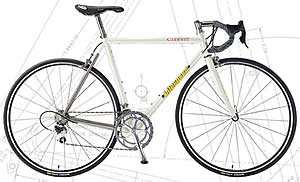 Road Racing Bike
Road Racing BikeTen pedal strokes is all it takes to hit 25 mph as I roll out my driveway and meet the road. Settling into the carbon drop handlebars, I relax my arms and imagine I’m in the Tour de France peloton. I fly down Bay St. hill and whip around the corner heading toward the coast. My narrow high-pressure Continental tires look fragile but they roll effortlessly and stick like contact cement in turns. I’m pedaling at 100 rpm now; my heart rate is at 150 as I start to fight the southerly headwind on the coast. I flatten my back to get even lower, shift into a slightly easier gear by flicking the Shimano Dura-Ace shifting brake lever sideways (no need to remove my hand from the handlebars) and find a nice pedal rhythm. I want a good workout but don’t want to blow up my legs before the climb so I keep a good pedal spin going and push just enough to feel a slight burn in my quadriceps muscles. Soon, I head east for the long climb. Shifting onto the small chainring, I stand to work up the steep part of the hill. My Litespeed thoroughbred weighs less than 17 pounds (there are full carbon-frame road racing bicycles today that weigh significantly less). With a superlight and incredibly responsive titanium or carbon frame (aluminum and steel are other options that work great, too) it’s a joy jamming uphill. I feel like I’m dancing on the pedals as I really push for the top. I can feel my legs tiring but I need to work so I keep pushing until my heart rate monitor limit alarm sounds. I visualize the pack of riders being dropped behind as I make my escape over the top of the climb. Ahead lie a series of downhill corners and I go into a full tuck to pick up speed without pedaling. I hear the wind whistling past my helmet and the tires singing as I burn the blacktop. The corners come at me fast but I relax and let the Litespeed do the work. All I have to do is lean the right way and the bike carves the perfect corner. Town line coming up; I’ve got to win the sprint. I bang the right shifter twice to hit a taller gear and jump for the line. I breathe like a weight lifter to power each pedal stroke and try to reach maximum rpm pulling on the handlebars with all my might. My standing muscles are blown so I fall into the saddle and try to rev my spin even more as I near the finish. The crowd roars as I blow through the tape. 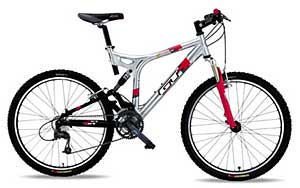 Full-Suspension Mountain Bike (types include
all-mountain, downhill, cross-country and more)
Full-Suspension Mountain Bike (types include
all-mountain, downhill, cross-country and more)I’m as happy on this bike at the trailhead as I am jamming singletrack. Why? Because people can’t stop gawking at it and I can’t get enough of explaining the trick action of the rear suspension. Those bikebrains at GT have this rig totally dialed. As the front and rear ends move up and down over five inches to suck up giant hits on bumpy trails, the crankset (where the pedals attach) is unaffected. As I hit the trailhead and start to climb, there’s no energy-sapping pogoing motion at the pedals. I feel the bike sucking up bumps so I can just sit here enjoying the ride. I notice a little more weight than what’s on my old front-suspended-only bike, but I feel the rear suspension is worth having. Veering onto the singletrack, I shift onto the middle chainring with a push of the Shimano LX Rapid Fire shifters and give a few quick pedals to pick up the pace. There’s a stretch of ruts ahead that’s a gas to hit at speed. On my old hardtail mt. bike, it used to scare me. But now, I bring more speed through the section and the momentum helps a lot. I have to slow and drop into a creek bed that I follow for a quarter mile or so. The water’s not deep so I can see all the rocks beneath. I hold tightly to the bars and get bounced off one rock after another. I’m not choosing the line; the rocks are doing it for me. Too cool. I have to hang on because each rock knocks the wheel off line. But the shock fork is great. I can handle these rocks and a lot of other obstacles thanks to five inches of fork travel and a super solid wheel-to-fork connection that ensures the bike goes where it’s pointed. The trail goes up a short embankment. It’s soft and loose. I shift into the easiest gear and try to spin up it. The rear suspension sticks the tire to the ground and it digs in but the front end wheelies. I stand and shift my weight forward to get the front on the ground and the rear wheel starts to lose traction again. I move toward the bike’s center and bounce with each pedal stroke to get the tires to dig in. I’m almost there. Argh! I lose it and fall over inches from making it. Righting the bike and myself I head back to the trailhead. I spot a couple guys disappearing around the corner and quickly shift into a harder gear to chase them down. I’m riding through a grassy clearing that’s very bumpy and tricky because I can’t see the bumps all that well. The faster I go, the smoother the ride gets so I shift up and push harder. I can see the fork soaking up the hits and realize that besides helping me fly over this minefield, the GT’s dual suspension is saving my tired bones loads of abuse. The boys ahead must be having as much fun as me because I haven’t closed an inch on them. It’s mostly downhill now and I’m supremely confident in what this bike can do, so I stand and jam a bit to build up as much speed as I can. I’d love to fly by these guys on the hill. Big mistake. I hit a berm in the first turn and get launched. Amazingly, I end up off the trail but the landing is whipped-cream soft and I don’t crash. All right! On with the chase. I’ll catch those guys yet.  Front Suspension Mountain Bike (also called
a hardtail)
Front Suspension Mountain Bike (also called
a hardtail)Thick fog compromises my sight so I put on clear lens glasses on my way out the door. I know it’ll warm up later and there’s no water on the trail we’re riding today so I take along my backpack hydration system. Tucked in the pocket is a great all-in-one tool that’ll allow me to fix anything that breaks on my or my friends’ bikes (they love me for it). There’s money in there too for the pre-ride coffee and the post-ride burrito. I meet my buds at the shop and we change plans because Joe has to get home sooner. Heading to Wilder Ranch, we opt for an out-and-back singletrack trail, so narrow we’ll ride single file. I hop in towards the front and hang on. Joe’s gotta get home so he’s cookin’. The trail is rocky and loose and it’s tough spotting the best line with someone in front. I back off a bit. Finding the right gear on this section is tricky too. Too easy a gear and the front end wants to pop up. Too tall a gear and you may get stuck at a tough spot, lose momentum and stall out. I shift into the middle chainring and the largest rear cog and bounce over the rocks that I can’t miss. I have to be careful not to whack my chainring or bottom out the tires against the rims. Nothing’s more frustrating that ruining a good ride with a breakdown. Everyone’s having the same problems finding the best line and gear and we have to walk a few technical spots. At one we stop to take turns trying to master this little stairstep ledge section. It seems like it should be rideable but we can’t manage. It’s hilarious watching people try, though. The trail smoothes but steepens. I’m glad to be on a superlight bike; all the less poundage to carry uphill. And it’s nice to be able to stand and really work the climb. I can feel the rear tire on the ground dig in with each pedal thrust as the bike’s stiff frame does its job transferring every ounce of oomph to the ground. Finally, we clear the top and get into a rolling wooded section. We’re all together only about 10 feet between bikers when we hit the whoop-de-doos, a series of small bumps spaced just far enough apart to let it rip. Joe’s still shreddin’ getting air off the top of each berm like some X-Games champ. I follow his lead but keep airtime limited. Still, the landings are soft thanks to 3 inches of travel from the suspension fork. We hit a clearing and race through a small stream before reaching the trail’s end. We’re exhausted but ready to do the loop again. 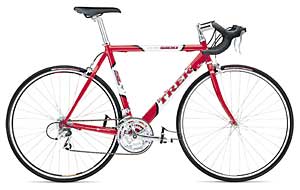 Road Sport (there are myriad types, such
as “endurance” (designed for a more upright, comfortable riding
position); and now “gravel” (made for dirt road riding).
Road Sport (there are myriad types, such
as “endurance” (designed for a more upright, comfortable riding
position); and now “gravel” (made for dirt road riding).I’ve been training for six weeks to build up my legs to do the fall century. I’ve heard about the ride for years. It’s a fundraiser for a good cause. I’ve also heard the food is great and that the course is scenic and challenging. I get to the start early and sign in at registration. There are a lot of other cyclists there. It’s great seeing all the different bikes and meeting some new people. I find a little group that seems about my speed and we start out. The ride begins with an extended climb. I shift onto the tiny inner ring on my triple-chainring crank and find the pedaling much easier. I’m not going fast but I feel like I can go all day and I make it up the hill with ease. At the top, people are waiting to meet up with those who came off the pace. We bunch up and head down the road. By working in a group, we make good time and roll into the first rest stop just in time. My two water bottles are almost empty. The food is as good as promised. What’s more, they’re playing jazz and the servers are in costumes. Too funny. Our group has had its fill so we roll out together toward lunch. There’s a lot to talk about and the pace is friendly. My Trek rolls smoothly over the rough pavement thanks to wider road tires (fairly flat-proof too) and a stretched wheelbase. I sit higher than I would on a full bore racing rig so my neck and back aren’t tweaked from reaching so far. I move my hands every 15 minutes or so to a different position on the handlebars to keep my upper body loose and my hands from numbing up. My padded saddle fits right and has enough cush to eat up bumps. I could ride all day on this bike — sometimes I do! Inspired by such a good ride and how easy it was to finish, I start planning a three-day trip to the mountains. I’ll add a rear rack and bag to the bike to carry some tools and a change of clothes. I’ll stay in hotels along the way to clean up each day and get a good night’s rest. It’ll be a blast. 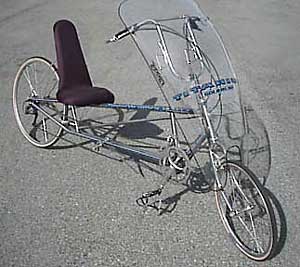 Recumbent
RecumbentI always hoped to own a fancy sports car. One day I still might. For now though, I’ve got an incredible substitute: a recumbent. Like that sports car, it offers fantastic handling, amazing top speeds and garners attention everywhere I go. Today, I’m doing a loop that starts with a tough climb and ends with a superb tailwind-blessed straightaway. Heading uphill away from the house, I shift onto the granny gear, the smallest chainring on my triple crankset and the largest cog on my cassette. This give me an easy gear to spin up the hill. I can’t stand to climb but I’ve ridden enough to develop the new muscles needed to ride uphill in the super-comfortable recumbent position. I’m not sitting on a conventional bike seat. My seat is comprised of a large cushion for my rear and a great backrest for my back. It’s true armchair comfort. There’s no need to even invest in special cycling shorts. My arms and back are comfy too because I’m not bending over at all. The handlebars are directly in front, chopper style. The controls couldn’t be easier to reach so there’s no stress on my shoulders, neck, hands or back. Reaching the summit, I turn toward the ocean, a three-mile downhill plunge. I watch the speedometer numbers race upward, 35, 45, 55! I know they’re accurate but the clear windshield on the front of the bike keeps the wind from striking my chest so I can’t really sense the speed. I’m nearing 57 mph as I hit the S turn near the bottom. I’m barely 2 feet above the ground but I feel supremely confident because I’m going feet first —there’s no way I can go over the handlebars on this bike. So, I bank through the turn like I’m in a Porsche, goosebumps breaking out on my arms and legs. Joining a favorable tailwind on the road to home, I can easily maintain 30 mph. That’s the advantage of sitting so low with my feet and arms leading the way to break the wind. Of course, the Zzipper windshield helps a lot too. I can’t get enough of this laid-back seating position. It’s really a bucket seat and I feel like I could actually be sitting in a sports car as I jam home. What’s more, I get so many stares when riding this bike, it’s obviously way more conspicuous than any four-wheeler you could buy — and a lot more affordable too. 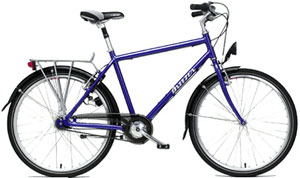 Hybrid (also called town/urban/city/commuter
or comfort bikes)
Hybrid (also called town/urban/city/commuter
or comfort bikes)I could drive to drop off the packages at the post office and run my other errands; but what a pain. There’s parking, exorbitant gas prices, traffic delays — even a chance of road rage or accident. I think I’ll take my Breezer. I’ve equipped it with a rear rack and panniers (bags that fit next to the rack) and a lock. I head away from my house and remember how sweetly this rig rides. The shock absorbing seatpost gobbles up bumps before they reach my butt and spine and the wide handlebars make it super comfortable sitting upright, the best position for pedaling in traffic because I can see everything. I hit the city streets and notice that the kids have been busy: glass litters the road. No worries, my street slicks are nearly impenetrable. I’ve also added thorn-proof tubes to help eliminate flats. I decide the streets are too busy and head toward the bike path that follows the river — no cars there. Rolling up to the post office, I find the bike rack and secure my machine. I remove the bags and snap them together forming a briefcase to carry inside. I gleefully notice that cars are circling trying to find parking spots. Business done, I head toward home when a thought strikes me: why not have some fun on the way back? I take the river path back but veer toward the railroad tracks to pick up a dirt road leading the back way home. The Breezer’s easy gears come in handy on the rollers leaving town and I’m soon up the climb and cruising along on a secluded road through the woods so very happy I left the car home. |
